- Home
- Technical Cooperation Projects
- Index of Countries
- Asia
- Thailand
- Project on seamless health and social services provision for elderly persons (S-TOP)
- Project News
- Japan Training "Introduction of the Policy for Seamless Care Service"
Project News
2019-02-22
Japan Training "Introduction of the Policy for Seamless Care Service"
S-TOP held the Japan training "Introduction of the Policy for Seamless Care Service" in Sapporo City and Ebetsu City of Hokkaido Prefecture from 18th until 22nd February 2019. The participants are directors, and representatives of hospitals which are engaged in treatment of sub-acute and recovery phases in the 7 pilot sites. Also, Directors of various ministries participated this training in Japan which are the Acting Director of Institute of Geriatric Medicine, Department of Medical Service, Ministry of Public Health, Director of Bureau of Elderly Health, Department of Health, Ministry of Public Health, and representatives from Ministry of Social Development and Human Security and National Health Security Office.
Throughout the training period, key person of each pilot site had a clear image of future plans of Intermediate Care (IMC)[1] and Seamless Care in Thailand. Many of the comments voiced by the participants were "We could see the care that was given is not only focused on curing diseases, as a patient as a whole, even when they need Long Term Care (LTC)". These also led the participants to discuss on what and how to achieve the most ideal service in Thailand.
Specifically, participants discussed on a strategy of a realistic seamless care operation and expansion in the Thai context. This is to be achieved by promoting the importance of continuous treatment and care, especially rehabilitation after acute phase and also to improve team approach and better cooperation between different occupations, cooperation between hospitals and LTC service providers, and to reconsider how to utilize local volunteers, such as health volunteers and elderly volunteers to downsize the Japanese service model to be applicable to the pilot sites in Thailand.
S-TOP will reflect the experiences acquired from the training to the plan for building a local seamless care model at every pilot site in Thailand in order to move forward to creating a better service model. Towards the end of the project, we will draft the policy recommendation based on the experiences from the process of trial and error.
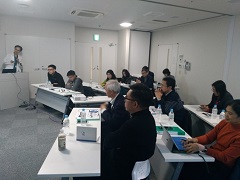 Lecture by PM&R Doctor
Lecture by PM&R Doctor
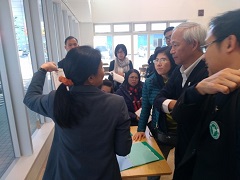 Discussion among participants during break time
Discussion among participants during break time
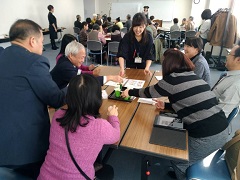 Studying Health Promotion and Nutrition activities by City Municipality
Studying Health Promotion and Nutrition activities by City Municipality
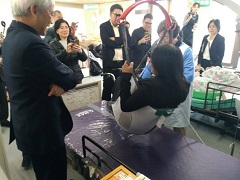 Experiencing welfare facility at Social Welfare Center
Experiencing welfare facility at Social Welfare Center
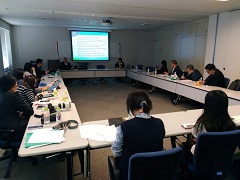 Presentation of Achievement from the training
Presentation of Achievement from the training
Note
- [1] Treatment and care provided after acute phase from onset of a disease until 6 months period. There are three services as Inpatient (IPD) rehabilitation (being hospitalized), Outpatient (OPD) rehabilitation and home visit rehabilitation depending on the level of Activities of Daily Living (ADL) at the time of discharging from acute phase hospital.
- About JICA
- News & Features
- Countries & Regions
- Our Work
- Thematic Issues
- Types of Assistance
- Partnerships with Other Development Partners
- Climate Change / Environmental and Social Considerations
- Evaluations
- Compliance and Anti-corruption
- Science and Technology Cooperation on Global Issues
- Research
- JICA Development Studies Program / JICA Chair
- Support for the Acceptance of Foreign HRs / Multicultural and Inclusive Community
- Publications
- Investor Relations
